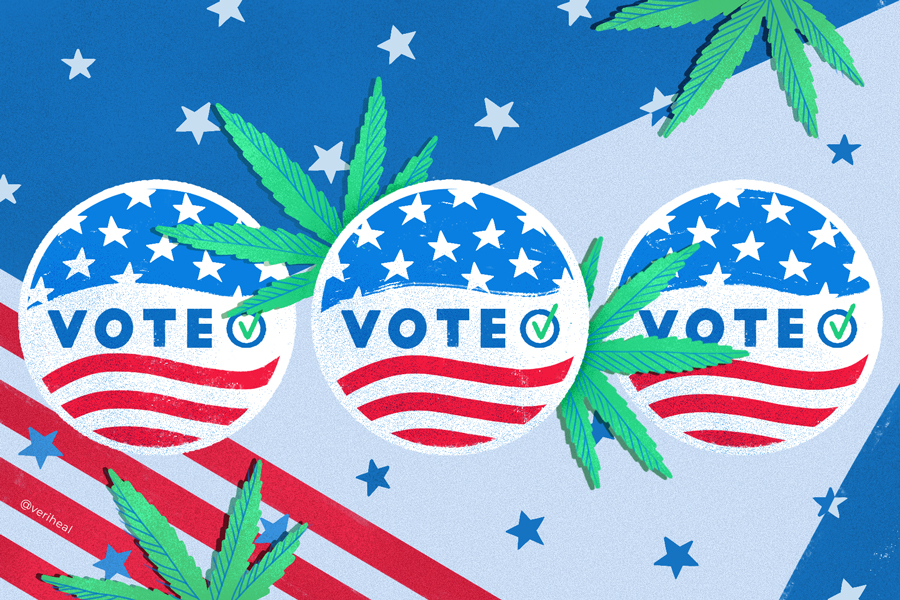With the dust settled and the votes all counted, it’s time to take a look at how cannabis fared in the 2022 midterm elections.
The states that had cannabis measures on the ballot included Arkansas, Maryland, Missouri, North Dakota, and South Dakota. In the United States, where cannabis is still illegal under federal law, there are currently 19 states and the District of Columbia that allow the recreational use of marijuana. There are 13 states that outlaw marijuana entirely. Additionally, 17 states have passed legislation allowing medical marijuana (MMJ). Of the MMJ states, Arkansas, Maryland, Missouri, South Dakota, and North Dakota had recreational cannabis on their ballots this November.
The votes fell short in Arkansas, North Dakota, and South Dakota, leading those states to reject ballot measures for recreational marijuana. In the two remaining states, Maryland and Missouri, voters approved the legalization of recreational marijuana.
Arkansas (Issue 4, Recreational Legalization): REJECTED
Arkansas voters rejected Issue 4, which would have legalized adult-use cannabis. This proposed regulation would have allowed adults over 21 to possess and use up to an ounce of marijuana, and grants would have been given to eight existing medical marijuana facilities so they could obtain a second license for non-medical sales. Arkansas legalized medical marijuana in 2016.
Maryland (Question 4, Recreational Legalization): PASSED
Maryland passed the legalization of marijuana! The Associated Press reported that 66% of Maryland voters favored the bill. Starting July 1, 2023, the ballot initiative will legalize personal possession of up to 1.5 ounces of marijuana for adults 21 and older. Possession of more than 1.5 ounces but less than 2.5 ounces will thereafter be punishable by a civil fine of up to $250. Possession of more than 2.5 ounces will be punishable by up to six months in jail or a fine of up to $1,000. This legislation also allows adults to cultivate two cannabis plants for personal use.
With the passing of this amendment, a complementary bill will expunge convictions for conduct that became legal under the new law, provide grants to better support minority and women-owned businesses in the cannabis industry, and remove criminal penalties for possession of 2.5 ounces or less of marijuana. These new measures will take time, and it is estimated that recreational products will not be sold until 2024 or even 2025. Starting Jan. 1, 2023, possession of marijuana will become a civil offense.
Why You Should Get Your Medical Marijuana Card
Veriheal has satisfied millions of patients nationwide by giving them access to these benefits
- Larger purchase limits
- Peace of mind
- Enhanced legal protection
- Access to higher potency strains
- Save up to 25% on cannabis purchases
- Skip the line at the dispensary
Missouri (Amendment 3, Recreational Legalization): PASSED
53% of Missouri voters have approved Amendment 3, a ballot measure legalizing recreational marijuana for adults 21 and older and expunging most records of past arrests and convictions. This legislation will allow people with marijuana-related non-violent offenses to “petition for release from incarceration or parole and probation and have records expunged.”. Missouri will create a lottery system to provide licenses and certificates and impose a 6% tax on cannabis to benefit certain programs.
North Dakota (Measure 2, Recreational Legalization): REJECTED
55% of North Dakota voters said “no” to Measure 2 which would have legalized marijuana. North Dakota passed a medical marijuana program in 2016. North Dakota also voted against cannabis legalization during the 2018 Midterm Elections. This initiative would have legalized the possession of one ounce of marijuana for adults aged 21 and older. Up to three plants could also be cultivated in residents’ homes. North Dakota currently allows for a medical marijuana program.
South Dakota (Measure 27, Recreational Legalization): REJECTED
In the 2020 election, South Dakota had two separate ballot measures related to legalizing cannabis. A lawsuit would eventually block this in 2021. The 2020 legislation included Constitutional Amendment A, which legalized recreational marijuana for adults when it passed with 54% of the vote. However, the South Dakota Supreme Court ruled that the measure could not become law because it violated the state’s requirement that constitutional amendments deal with just one subject.
In the 2022 round of voting, it was reported that 53% of voters rejected Measure 27. South Dakota has not forgotten about 2020. Kristi Noem, who was governor in 2020 and won reelection, told voters she would not get in the way of marijuana legalization a second time around, should the initiative pass. She quickly contradicted herself by urging people to vote against the measure in campaign ads. South Dakota will continue to allow a medical marijuana program.
Colorado (Proposition 122, Psychedelics Legalization): PASSED
While Colorado has had medical and recreational cannabis for some time, the state recently made great strides in a different kind of drug reform. Following midterm elections, Colorado is officially the second state to legalize psychedelics. The first state to legalize psychedelics was Oregon in 2020. Colorado’s Proposition 122 passed with 51% of voters approving the initiative.
Coloradans now have the right to grow, possess, and use psilocybin and psilocin-containing mushrooms. Three other plant-based psychedelic substances—mescaline, ibogaine, and dimethyltryptamine—were also legalized with the passing of Proposition 122. Keep your eye out for Colorado-licensed “healing centers” where people can take magic mushrooms under supervision.
Author, Share & Comments
















